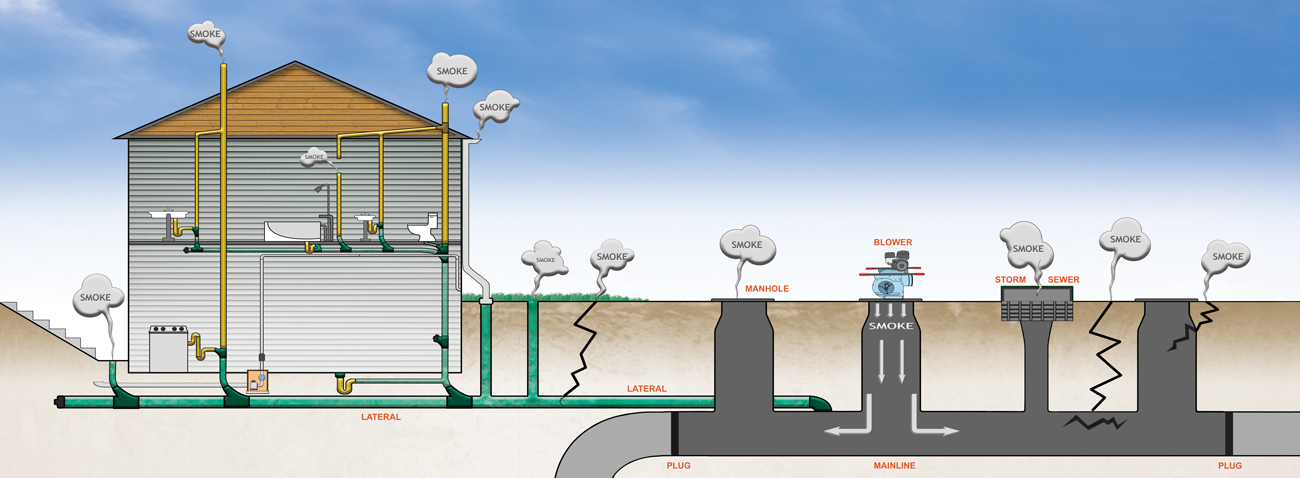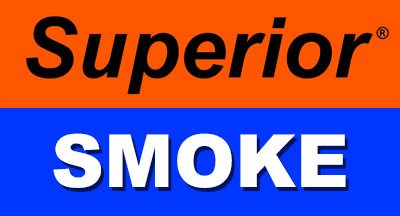Smoke Testing: What Homeowners Need to Know
What is a Smoke Test?
Smoke testing is the industry standard method of identifying sources of surface inflow to the sanitary sewer, which leads to reduced efficacy of local sewer treatment plants.
A Smoke Test uses non-toxic smoke and high capacity blowers to blow smoke through the sanitary sewer lipes. In the image below, a blower is placed on top of a manhole, forcing smoke down into the sewer. If smoke is exiting the ground where there is no connection to the sewer lines, this indicates a place where rain or surface water could enter the sewer system. During a smoke test, a work crew will walk the neighborhood, take pictures of any faults in the system where smoke is coming out of the ground, and mark locations for repair.

Common sources of sewer inflow include:
- Roof Downspouts
- Unconnected Sewer Lines
- Abandoned Sewer Lines
- Leaking Manholes
- Cross Connected Storm Drains
- Broken Laterals or Mains
- Cross Connected Sanitary Lines
- Cellar Drains
- Yard / Foundation Drains
- Sump Pumps
Sewer testing helps your community identify these faults, helping to stop basement backups, overflows, and higher treatment costs.
How should I prepare for a Smoke Test?
Prior to testing date, pour ½ gallon of water in all basement floor drains or seldom used sink/shower drains and be sure to flush any seldom used toilets. This ensures that drain traps are filled with water and smoke will not enter the house through any normal, working sewer-line connections. As demonstrated in the photo below, this “traps” water in the pipes, and is called “filling your traps.
Do I need to be home during a Smoke Test?
No, homeowners do not need to be home during testing. Do not leave pets unattended in a confined space.
How will I know if smoke enters my house if I am not home during testing?
The purpose of Sewer Smoke Testing is to identify improper sources of water entering the public portion of the sewer system. While it is also beneficial to identify deficient plumbing connections on private property, this is not the main intent of the testing and it is the responsibility of the homeowner to maintain the plumbing on their private property.
Will Smoke Testing the sewers allow smoke to get into my house?
No, if your plumbing is correctly installed and functioning properly, and your “traps” are all filled with water, then no smoke should enter your home. Very few homes typically get smoke in them from sewer smoke testing.
What does it mean if smoke is in my house? What should I do?
If all sewer connections are working properly and there are no open faults in the home, all smoke should run through the sewer lines and out the building’s roof vents. This is normal.
The unusual event of smoke entering the home means there is an open fault, where sewer gas has been entering the home for months or years. This sewer gas is poisonous and highly dangerous to residents, while the smoke is harmless and leaves no residue—it serves only to identify open faults in the house’s plumbing. Once inside the house, the smoke will dissipate in approximately 20 – 30 minutes. If you notice smoke entering your home, you should open doors and windows and leave the house until the smoke dissipates in order to reduce exposure. It is important to immediately notify a member of the smoke testing crew working in your area so the fault can be identified and addressed. You should then call a licensed plumber and repair the fault as soon as possible.
Smoke in your house could be indicating that:
- The vents connected to your home’s sewer pipes are inadequate, defective, or improperly installed.
- The traps and seals under sinks, showers, tubs, toilets, and all other drains are dry, defective, or improperly installed.
- The pipes, connections, or seals in the wastewater drainage system or under your home are damaged, defective, are missing plugs, or are improperly installed.
If the smoke is harmless, why is it recommended to evacuate the building?
This is a precautionary measure in case the smoke is due to a real fire rather than the sewer testing, and also because smoke from the sewer testing indicates that dangerous sewer gasses are also entering the home. Although the testing smoke is not toxic, dense smoke or prolonged exposure can be irritating to mucus membranes so it is always best to minimize exposure.
Can the Smoke Test activate the smoke alarms?
Yes, smoke alarms may be activated by testing. Open windows or doors for ventilation if possible.
What does it mean if smoke is in my yard or driveway?
This could mean that a drain on the property is connected to the sewer lateral or that the lateral has breaks or cracks in the pipe, causing drain runoff that contributes to sewer backups and overflow.
Is the smoke hazardous?
No. The smoke is non-toxic and harmless. It is light in color, leaves no residue, and does not create a fire hazard. People with particular respiratory sensitivity should avoid exposure to all types of smoke.

